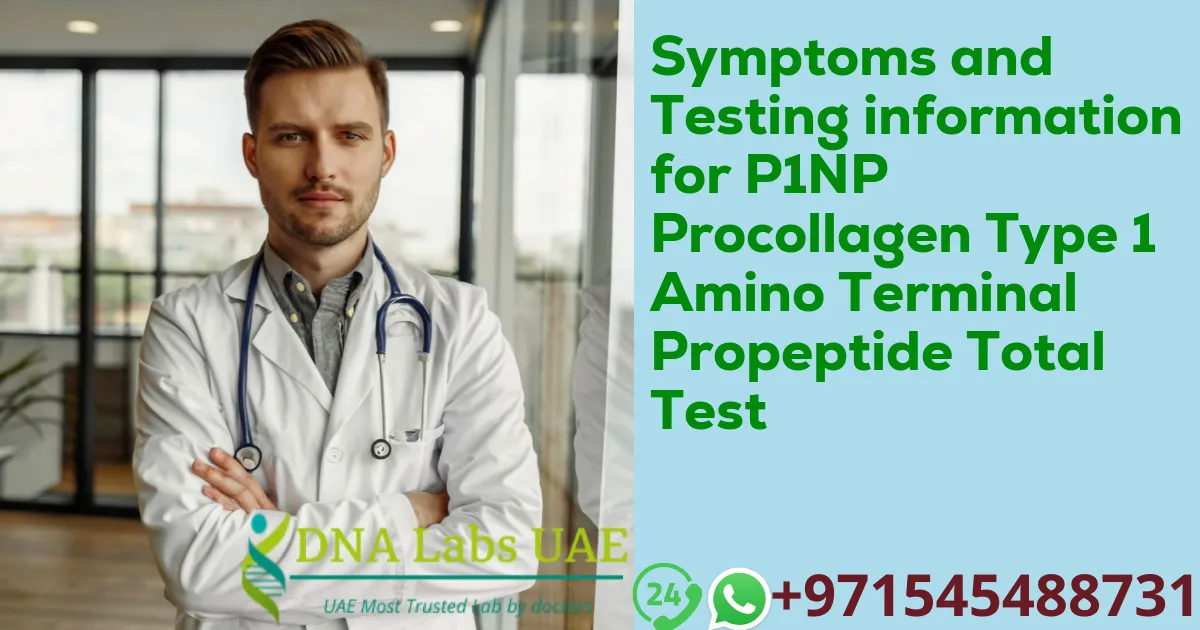—
Understanding the Symptoms That Necessitate a P1NP Procollagen Type 1 Amino Terminal Propeptide Total Test
Bone health is a critical aspect of overall well-being, often overlooked until significant symptoms or health events bring it to the forefront of our attention. One of the key indicators of bone metabolism and health is the level of P1NP (Procollagen Type 1 N-Terminal Propeptide) in the blood. This marker provides invaluable insights into the rate at which bone is being formed, which is crucial for diagnosing and monitoring conditions related to bone density and strength.
The P1NP Procollagen Type 1 Amino Terminal Propeptide Total Test is a specialized assessment designed to measure the amount of P1NP circulating in the bloodstream. An elevated level of P1NP can indicate increased bone formation, which, depending on the clinical context, can be either a positive sign of bone recovery or a symptom of an underlying condition that requires attention.
Symptoms Indicating the Need for a P1NP Test
Several symptoms and conditions may prompt a healthcare provider to recommend a P1NP test. These include, but are not limited to:
- Unexplained fractures: Experiencing fractures with minimal or no trauma can be a sign of weakened bones, necessitating a deeper look into bone formation rates.
- Conditions affecting bone density: Diseases such as osteoporosis or osteopenia, which result in reduced bone density and increased fragility, may require monitoring through P1NP levels.
- Monitoring bone metabolism disorders: Conditions that affect how bones grow or break down could lead to changes in P1NP levels, indicating the need for testing.
- Assessing the effectiveness of treatment: For patients undergoing treatment for bone-related conditions, P1NP levels can provide insight into how well the treatment is working in terms of improving bone formation.
It’s important to note that the need for a P1NP test is not solely determined by the presence of symptoms. In some cases, individuals with risk factors for bone metabolism disorders might undergo testing even in the absence of overt symptoms, as a preventive measure.
Understanding the Test Cost
The cost of a P1NP Procollagen Type 1 Amino Terminal Propeptide Total Test is 370 AED. This investment in your health provides critical information that can guide the management and treatment of conditions affecting bone health.
Conclusion
Maintaining bone health is essential for a quality life, and understanding the underlying processes of bone formation and resorption is a critical part of this endeavor. The P1NP test offers a window into these processes, providing valuable data for diagnosing, monitoring, and treating bone-related conditions. If you’re experiencing any of the symptoms mentioned or have risk factors for bone metabolism disorders, consulting with a healthcare provider about the P1NP test could be a step in the right direction for your bone health.
For more information on the P1NP Procollagen Type 1 Amino Terminal Propeptide Total Test and to schedule your test, please visit DNA Labs UAE.
—
Understanding the Symptoms That Necessitate a P1NP Procollagen Type 1 Amino Terminal Propeptide Total Test
Bone health is a critical aspect of overall well-being, often overlooked until significant symptoms or health events bring it to the forefront of our attention. One of the key indicators of bone metabolism and health is the level of P1NP (Procollagen Type 1 N-Terminal Propeptide) in the blood. This marker provides invaluable insights into the rate at which bone is being formed, which is crucial for diagnosing and monitoring conditions related to bone density and strength.
The P1NP Procollagen Type 1 Amino Terminal Propeptide Total Test is a specialized assessment designed to measure the amount of P1NP circulating in the bloodstream. An elevated level of P1NP can indicate increased bone formation, which, depending on the clinical context, can be either a positive sign of bone recovery or a symptom of an underlying condition that requires attention.
Symptoms Indicating the Need for a P1NP Test
Several symptoms and conditions may prompt a healthcare provider to recommend a P1NP test. These include, but are not limited to:
- Unexplained fractures: Experiencing fractures with minimal or no trauma can be a sign of weakened bones, necessitating a deeper look into bone formation rates.
- Conditions affecting bone density: Diseases such as osteoporosis or osteopenia, which result in reduced bone density and increased fragility, may require monitoring through P1NP levels.
- Monitoring bone metabolism disorders: Conditions that affect how bones grow or break down could lead to changes in P1NP levels, indicating the need for testing.
- Assessing the effectiveness of treatment: For patients undergoing treatment for bone-related conditions, P1NP levels can provide insight into how well the treatment is working in terms of improving bone formation.
It’s important to note that the need for a P1NP test is not solely determined by the presence of symptoms. In some cases, individuals with risk factors for bone metabolism disorders might undergo testing even in the absence of overt symptoms, as a preventive measure.
Understanding the Test Cost
The cost of a P1NP Procollagen Type 1 Amino Terminal Propeptide Total Test is 370 AED. This investment in your health provides critical information that can guide the management and treatment of conditions affecting bone health.
Conclusion
Maintaining bone health is essential for a quality life, and understanding the underlying processes of bone formation and resorption is a critical part of this endeavor. The P1NP test offers a window into these processes, providing valuable data for diagnosing, monitoring, and treating bone-related conditions. If you’re experiencing any of the symptoms mentioned or have risk factors for bone metabolism disorders, consulting with a healthcare provider about the P1NP test could be a step in the right direction for your bone health.
For more information on the P1NP Procollagen Type 1 Amino Terminal Propeptide Total Test and to schedule your test, please visit DNA Labs UAE.
“`



